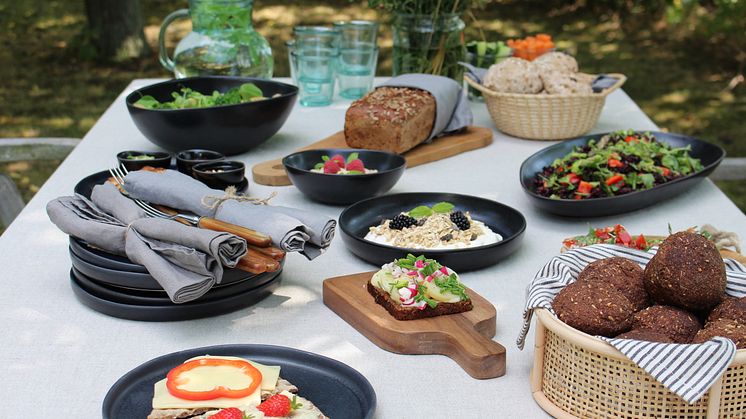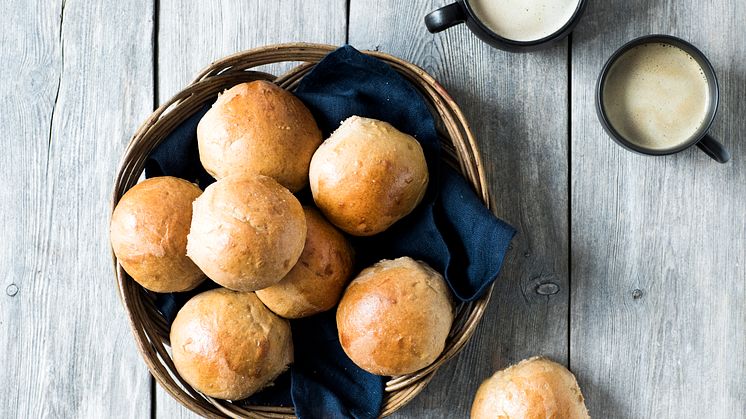
Nyhed -
Mød en fuldkorns ildsjæl - mød Jan-Willem van der Kamp
Nogle gange er man heldig at møde et menneske som fylder et rum op med nærvær og glæde på en helt særlig måde. Sådan en person er Jan-Willem Van Der Kamp fra Holland. Jan-Willem er samtidig en stor foregangsmand for fuldkorn og har været det i flere årtier. Jan opbygger venskaber og udbreder kendskabet til fuldkorn og arbejder for at få lande verden over til at gå "all in" på fuldkornsdagsordenen. Vi har mødt Jan-Willem mange gange. Fx dengang han på en konference i Wien tog violinen frem og spillede oplægsholderne op og ned fra scenen til en 'galla' middag. Lad dette interview om fuldkorn, klima, bæredygtighed, pandemien og venskaber blive en del af din sommerferielæsning.
Jan-Willem Van Der Kamp joined in 1985 TNO, the Netherlands Organisation for Applied Scientific Research as director of cereal research. As Senior Officer International Projects he was and is involved in a wide range of national and EU projects, including HEALTHGRAIN (2005-2010) the largest cereals and health related project ever. With Kaisa Poutanen and others he founded in 2010 the Healthgrain Forum where he served as a board member and co-authored the Healthgrain Forum publications on the definitions of whole grain and whole-grain foods. He is now chairing the International Working Group on Definitions of the Whole Grain Initiative This group developed the definition of whole grains as food ingredient, which is now approved and endorsed by the Healthgrain Forum, ICC and AACCI/Cereals&Grains Association. Jan-Willem is also part of the scientific committee for the Whole Grain Summit October 2021.
We have met and worked together with Jan-Willem several times within the Healthgrain Forum and are very inspired by his amazing and dedicated work to increase whole grain consumption and Jan-Willems ability to create excitement and enthusiasm wherever he goes.
- When and how did you become interested in cereals? After my study in chemistry, I started working in food research at Unilever; but at TNO I became really interested in cereal research, also due to my involvement in major EU projects, such as HEALTHGRAIN, mentioned above, and in the key international scientific associations in this area. In in 2002-2004. I served as President of the International Association for Cereal Science and Technology - ICC, where I still am active, 2005-2007 I acted as International Director in the Board of the USA-based AACCI, now the Cereals & Grains Association.
- In the Healthgrain Forum you have done a remarkable work. What has been the best experience so far - working within the Healthgrain Forum? Before the beginning of the Forum, in 2010, many national and international bodies considered in fact only fruits and vegetables as important healthy food categories. The role of whole grains was often (almost) neglected, with some notable exceptions such as in Denmark. The activities of the Healthgrain Forum, contributed significantly to the recognition of the important role of whole grains for public health. These activities included the highly appreciated grains and health symposia in global and European nutrition and health conferences and activities in the EU policy area with symposia held in the European parliament.
- You are incredibly good at gathering stakeholders across countries. Do you have any good advice, if someone wants to do the same – what, in your experience, is important and what should you pay attention to? Creating and strengthening a network is of key importance for this type of work. I was stimulated and supported quite a lot by MANY friends and relationships, that I met in all the conferences, project meetings and other contacts in the past decades There you don’t share only scientific knowledge but also other experiences such as dancing the Sirtaki in Greece and the polonaise in Manhattan (‘the little apple’- Kansas, USA), post-conference tours in the inlands of China, a tango evening in Argentina, a mid-summer celebration in Finland, a midnight tour in the Sinai, Egypt, to name a few. In my holidays, when a cereal research center was nearby, I left my family for half a day for visiting them. In this way one makes new friends and strengthens old relationships. In addition to this, my various positions in and outside TNO helped me in getting a kind of overview of key issues, priorities, and sensitivities around the world.
- Have you seen any changes in the consumer behavior in the Netherlands during the pandemic? (when it comes to eating cereals and baking) Yes, the pandemic greatly influenced the behavior of consumers: interest in healthy nutrition and a healthy diet has increased significantly, as well as the appreciation of suppliers in the own town and region. In the bakery area, before the pandemic, wholemeal bread (with 100% whole grain flour) was the number 2 in the bread area, next to the number one, ‘brown bread’, - with 50% whole grain and 50% refined grain. But now the bread with 100% whole meal flour is the number one. Also the turnover of artisan bakeries – small, nearby companies – increased more than sales of bread sold in supermarkets. We also see a decreased concern about gluten and about diets high in carbohydrates, but it is unclear whether this is related to the pandemic.
-
How do you think focusing on the climate, will affect the consumption of grain products – and whole grain products in the future? A primarily plant-based diet is now widely recommended as good for your health AND for the planet. This is increasingly communicated in (inter)-national nutrition-health websites.
Consumption of grain products based on whole grains is emphasized in sustainable diets. For example, the EAT-Lancet commission’s recommends 232g whole grain products per day. – e.g. eight ~ 30g slices of bread. Also, a substantial increased consumption of pulses is recommended, as a key source of vegetable proteins. Consumption of high levels of whole grains also contributes also to a high intake of cereal fibers, the type of fibers most convincingly associated with a range of health benefits and, as shown in recent research, also contributing to gut health and a diverse gut microbiome. Currently a fiber intake of ~30g /day is recommended. Recent studies recommend a higher intake of fiber of at least 50g/ day (note: still less than the intake in Europe before ~1900). Currently most of the bran produced in flour mills is used for animal nutrition, but in the sustainable future, the size of this market may decrease substantially. Another sustainability related concern is the need for an increased biodiversity. In the past century the production of wheat, maize and rice increased substantially, but production of many other grains decreased. A diverse agriculture is required. For a healthy planet and a healthy soil
In my view, all this will have a substantial impact on the production and consumption of grains. Some thoughts to consider: We may (have to) move towards higher recommended levels for intake of whole grains. And to the combination of grains and pulses, with their complementary amino acidprofile? Can we respond to the need for more biodiversity by stimulating the production of grains other than the ‘big three’, or by just ensuring a rich biodiversity in varieties of wheat, maize and rice? - Can you tell us about a few of your favorite Dutch whole grain foods or recipes? Wholegrain wheat- and also rye bread (daily) and whole grain pasta (occasionally), all with 100% whole grains are my standard choices for many years. This year I replaced milk with Oatley’s whole grain oat milk – Oatley's performs very well in café latte!
- How do you see future challenges and priorities in the whole grain area? Considering the sustainability and (gut) health issues mentioned above, we probably have to move towards substantially higher intake recommendations for whole grain, possible also taking into account the combination with pulses. As a consequence, definitions for minimum levels of whole grain in whole grain foods also may have to be revised in countries like Denmark, where a rather lenient definition was chosen in the past. This worked well for getting people acquainted to whole grain products. However, it does not work for stimulating the food industry to make efforts in developing attractive products with higher levels of whole grain. It will also be a challenge to develop a revised communication strategy.
-
You are a part of the Committee for the online Whole Grain Summit this October (2021). Can you tell us about the aims and content for the Summit? With every Whole Grain Summit, the evidence for the need for a high intake of whole grains is becoming more convincing – now not only from the health but also from the sustainability perspective. And, although intake of whole grains is slowly growing worldwide, it is still far below the recommended levels. So the main aim for the summit is to discuss how to contribute to an increased intake of whole grains. The three main themes: Nutrition-health, Technology and Consumers & Communication are now including for the first-time sustainability as an issue to be addressed. In the Nutrition-health section a key message will be that recommendations in the new front-of-pack schemes that are emerging world-wide, such as Nutriscore, should be in line with dietary recommendations and should also recommend whole grain consumption. In the Consumers section the successes and future perspectives of personalized nutrition advice for increasing whole grain consumption will be highlighted. Here the combination of providing dietary recommendations and providing behavioral change guidance seems promising.
With all these new developments I really look forward to this inspiring summit!



